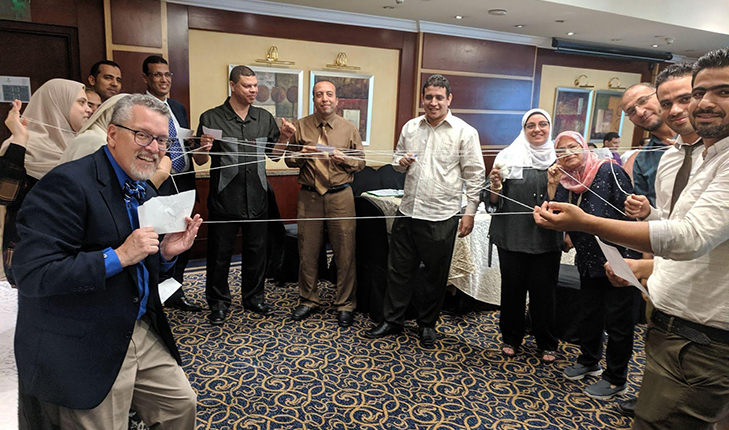How cross-cultural similarities can bridge the gap between nations and foster a shared educational experience
Situated beside the dusty and still banks of the Nile River is the neighborhood of Maadi, a small province in Cairo, Egypt, known for its forested streets and exotic dining scene. It provides a diverse, global experience, offering a variety of blended cultures and universal dishes to appease its visitors.
After visiting Egypt a number of times in 2019 and 2020, Dr. Emily Walter and Dr. Frederick Peinado Nelson have begun partnering with five universities in Egypt, and several local academic institutions, to implement two post-baccalaureate certificates, one in science, technology, engineering and math (STEM) teaching and one in STEM leadership, and they are currently supporting the development of courses for a four-year undergraduate STEM teaching diploma.
STEM education reform efforts typically focus on high school age children. Walter and Nelson’s primary focus is centered on using innovative education techniques, relevant to both future and current teachers. Their goal is to illustrate how STEM learning can be an interactive and enjoyable experience through more hands-on methods as opposed to the traditional lecture style of teaching with students of all ages.
Five universities are the primary recipients of these project-based lesson plans. The lessons are trans-disciplinary and connect to many of Egypt’s regional and social challenges. Egypt’s ecological and cultural struggles are similar to the Central Valley, many of which include pollution, poor air quality, a struggle to obtain clean drinking water, a lack of affordable housing and congested traffic amid an effort to create a safe environment for nature to prosper. These challenges offer realistic situations and data for STEM learning, as well as providing a global perspective in the minds of the students as they realize the vastness of the human experience.
This blossoming education program owes its thanks to the multi-institutional STEM Teacher Education and School Strengthening Activity (STESSA) project, funded by the U.S. Agency for International Development, which took root in April 2018, with the generous contributions of five universities, including Cal Poly-San Luis Obispo, Fresno State and the 21st Century Partnership for STEM Education, a nonprofit educational foundation in Philadelphia. The lead partners supporting this endeavor are Fresno State’s College of Science and Mathematics, the Kremen School of Education and Human Development and the Lyles College of Engineering. They are currently being funded by a $24.2 million grant presented by the STESSA project.
Nelson and Walter have worked extremely hard helping to design teacher education programs in Egypt and providing attentive educational support to help educators from abroad refine their teaching systems. Their goal is to network with other educators whose backgrounds are strikingly different from their own and cross-compare techniques that can help benefit their students.
“Emily and I have been working with the faculty in Egypt for some time now and have formed some amazing relationships with folks who also treasure science and education,” Nelson said. “We cannot wait to see our work pay off once they employ it in their curriculums.”
(Written by Audra Burwell, a creative writing student.)





